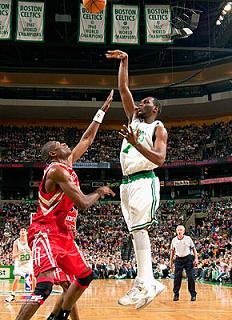 In a recent interview with NBA.com, Portland Trail Blazers President Steve Patterson discussed why he opted to pass on Al Jefferson with the 13th pick in the 2004 NBA Draft:
In a recent interview with NBA.com, Portland Trail Blazers President Steve Patterson discussed why he opted to pass on Al Jefferson with the 13th pick in the 2004 NBA Draft:
I'm surprised by Patterson's candor. Revealing that a prospective draft pick failed or struggled with a psychological test is a rather disparaging nugget of information. Granted, this revelation was made two years after the fact, and since that time, Jefferson has played reasonably well for the Boston Celtics, who drafted him with the 15th pick in the 2004 NBA Draft. He has also been a good teammate/citizen by all accounts (e.g., Celtics Blog on Jefferson; True Hoop on Jefferson).We had to fly a psychologist down there for him to take a test. He had difficulty with it. There were some other things that weren’t positive about him that I’m not going to talk about in the interview.
But should Patterson have publicly disclosed medical information obtained in a pre-employment inquiry? And could he have broken the law by doing so?
Generally, employers are forbidden from disclosing to a third party any medical information requested of an applicant or voluntarily revealed by an applicant during the interview process. In fact, any medical information obtained by a prospective employer must be safeguarded from other applicant materials (i.e., kept in a different file, with heightened protection from accidental disclosure). This is part of the duty of confidentiality owed by employers to applicants. This duty can be waived if the applicant later assents to a disclosure, or if there is a court order directing a disclosure.
Presumably, Patterson would argue that the process leading up to a sports draft should be considered qualitatively different from a normal interview process. This argument, however, would probably not work, as plaintiffs and defendants in lawsuits concerning pro sports drafts have usually treated them akin to collectively-bargained employment practices. Moreover, even if there was a distinction, it may not be salient to the circumstances in this instance.
A better argument for Patterson may be that a psychological examination for a prospective draft pick is not a medical examination. And the U.S. Equal Employment Opportunity Commission has stated:
Psychological examinations are medical if they provide evidence that would lead to identifying a mental disorder or impairment. For example: An employer gives applicants an RUOK Test, an examination that reflects whether applicants have characteristics that lead to identifying whether the individual has excessive anxiety, depression and certain compulsive disorders.We don’t know enough about the psychological examination administered to Jefferson to make an assessment, but I suspect it went beyond what is normally examined in a non-medical psychological examination. We also don't know if Jefferson assented to the disclosure, or if, by merely participating in the draft, all prospective draft picks assent to this type of disclosure.
On the other hand, psychological examinations designed to measure only things such as honest, tastes, and habits, are not medical. For example: An employer gives the IFIB Personality Test, an examination designed and used to reflect only whether an applicant is likely to lie.
Slander laws may also be relevant in this analysis: by telling the world that Al Jefferson struggled with a psychological test, Steve Patterson may have defamed him. And just think about what comes to your mind when you hear that someone struggled with a psychological test--there's a good chance you may think that he's crazy or dangerous, or at least weird. You might also equate "psychological test" with "intelligence test," even if they are very different types of examinations. But not only is slander's standard of proof higher for public figures, but truth is an absolute defense, and Patterson seemingly told the truth: Jefferson struggled with a psychological examination.
I think it is fair to say that Al Jefferson is highly unlikely to pursue any kind of litigation against Steve Patterson and the Portland Trail Blazers, even if the relevant statue of limitations were favorable. Not only is Jefferson off to a promising NBA career, but the viability of any prospective claim seems questionable. For that reason, the analysis in this post is very much a thought exercise, rather than any kind of litigation roadmap. On the other hand, if a GM in the future were to make a similar remark, and if the affected player weren't off to a successful career, perhaps there would be some practicality to all of this.
Regardless, I do question the appropriateness of Patterson’s comment. Badmouthing someone in public is almost never a good idea, particularly when you question their mental state. Perhaps there is a pattern here with NBA teams and NBA players.
Also see: Paul Secunda of Workplace Prof Blog discussing this post (6/14/2006).
Also see: Adam Kolber of Neuroethics & Law Blog discussing this post (6/13/2006).





0 comments:
Post a Comment